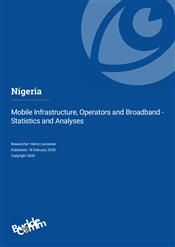Nigeria - Mobile Infrastructure, Operators and Broadband - Statistics and Analyses

Last updated: 18 Feb 2020 Update History
Report Status: Archived
Report Pages: 91
Lead Analyst: Henry Lancaster
Contributing Analyst: Peter Lange
Synopsis
Nigeria has Africa’s largest mobile market, with about 173 million subscribers and a penetration rate of 123%. The number of subscribers fell in 2017 as consumers responded to a poor economic climate and as regulatory measures continued to oblige operators to disconnect unregistered SIM cards, though growth into 2019 was strong. The initial rapid growth in the number of subscribers had led to problems with network congestion and quality of service, prompting the regulator to impose fines and sanctions on network operators. These operators have responded by investing billions of dollars in base stations and fibre transmission infrastructure to support the increasing demand for data. The migration from the CDMA platform to GSM technology is almost complete, and though GSM still dominates the market there is a growing shift to services based on LTE. Although LTE coverage remains relatively low, investment among operators is extending the reach of services and is helping to develop consumer use of mobile data services.
Efforts are also being made to encourage network sharing and to outsource the management of tower infrastructure to third parties. There remains considerable growth potential in rural areas where the provision of network infrastructure and operations is expensive, and consequently where mobile penetration is lower. The government’s plan to increase broadband penetration to 70% by 2021 largely depends on mobile infrastructure.
Key developments:
- MTN Nigeria launches services based on LTE-A;
- SIM card registration policy revised;
- Nigerian Civil Aviation Authority suspends planned demolition of 8,800 mobile towers;
- Office of the National Security Adviser establishes committees to deal with counterfeit mobile devices;
- Visafone completes transfer of CDMA subscribers to GSM;
- MTN and Airtel apply for Payment Service Bank licence;
- Government commits to increasing mobile broadband penetration to 70% by 2021;
- Disagreements emerge among new shareholders of 9Mobile;
- Regulator calls for an additional 80,000 mobile base stations;
- MTN Nigeria awarded spectrum in the 2.6GHz band for LTE use, extends licenses for spectrum in the 900MHz and 1800MHz bands to August 2021;
- New MTRs assigned;
- Additional base stations installed under the USPF program;
- Report update includes operator data to Q4 2019, regulator’s market data updates to December 2019, recent market developments.
Companies mentioned in this report:
MTN Nigeria, Glo Mobile (Globacom), Bharti Airtel (formerly Zain, Celtel), 9Mobile (Etisalat Nigeria, EMTS, Mubadala), M-Tel (Nitel), Visafone, Starcomms (Capcom), Multi-Links, Reliance, InterC Network (Intercellular), Megatech Engineering (Zoda Fones), Telkom, Econet Wireless, Vodacom.
Related Reports
- Africa - Fixed Broadband Market - Statistics and Analyses
- Nigeria - Telecoms, Mobile and Broadband - Statistics and Analyses
- 2019 Africa - Mobile Network Operators and MVNOs
- Ethiopia - Telecoms, Mobile and Broadband - Statistics and Analyses
- Morocco - Telecoms, Mobile and Broadband - Statistics and Analyses
- Namibia - Telecoms, Mobile and Broadband - Statistics and Analyses
- Madagascar - Telecoms, Mobile and Broadband - Statistics and Analyses
- Benin - Telecoms, Mobile and Broadband - Statistics and Analyses
- Cameroon - Telecoms, Mobile and Broadband - Statistics and Analyses
- Eritrea - Telecoms, Mobile and Broadband - Statistics and Analyses
Share this Report
TMT Intelligence
A platform to scale your intelligence tasks
Monitor critical insights with our AI-powered Market Intelligence Platform gathering and analyzing intelligence in real time. With AI trained to spot emerging trends and detect new strategic opportunities, our clients use TMT Intelligence to accelerate their growth.
If you want to know more about it, please see:
Research Methodology
BuddeComm's strategic business reports contain a combination of both primary and secondary research statistics, analyses written by our senior analysts supported by a network of experts, industry contacts and researchers from around the world as well as our own scenario forecasts.
For more details, please see:
More than 4,000 customers from 140 countries utilise BuddeComm Research
Are you interested in BuddeComm's Custom Research Service?
Hot Topics
News & Views
Have the latest telecommunications industry news delivered to your inbox by subscribing to BuddeComm's weekly newsletter.